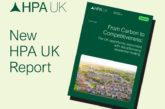
OFTEC has said it has received evidence that its work to develop a low carbon liquid fuel to replace kerosene could provide the answer to reducing carbon emissions from heating rural homes.
Earlier this year, OFTEC commissioned a series of independent reports into the viability of liquid biofuels to meet the future needs of the 2.2 million homes across the UK and Republic of Ireland which currently rely on oil. The initial findings reportedly offer a positive reading.
The reports outline the growing demand for biofuels from the UK and EU and the willingness of major suppliers to meet this, as well as their interest in new markets such as domestic heating.
Biodiesel from waste blends, primarily Used Cooking Oil Methyl Ester (UCOME) and Tallow Methyl Ester (TME), would provide the most likely solution in the short term, moving to blends from other waste streams in the medium to longer term.
The reports also recognise current concerns over sustainability of supply but suggest that this will be addressed as the biofuel market develops further and demand grows, technologies advance and other sources of raw material become more readily available.
Speaking during Green GB Week, OFTEC CEO, Paul Rose, said: “Over the past 12 months since government launched its Clean Growth Strategy, OFTEC has made significant strides towards its ultimate goal of delivering a realistic, affordable solution that meets the challenge of decarbonising heat from off grid households. We firmly believe the answer lies in biofuels and these latest reports add further credence to our thinking.
“Rather than expecting oil heated households to replace their heating system with a different technology such as a heat pump, switching to a low carbon biofuel which would be a much less expensive option for the majority. A liquid biofuel would offer these households an almost drop-in replacement for kerosene.
“A high percentage of UK rural homes have poor thermal efficiency and would require disruptive and very expensive energy efficiency improvements before technologies such as heat pumps can be successfully installed. In many cases this would neither be practical or cost effective.
“We are working closely with the Department for Business, Energy and Industrial Strategy alongside wider industry, to ensure that oil heated homes are provided with the right, future proof low carbon solution for their needs.”
Green GB Week is a government initiative designed to promote the opportunities to reduce emissions and grow the low carbon economy. It comes on the back of the landmark report published by the UN Intergovernmental Panel on Climate Change (IPCC) which warned that governments must take ‘rapid, far reaching and unprecedented changes in all aspects of society’ to avoid disastrous levels of global warming by 2030.
Paul concluded: “The IPCC report starkly outlines the urgent need to ramp up action on climate change now. We are continuing our calls to government to support our work in transferring oil heated homes to a low carbon future in the most cost-effective way and will continue to channel our resources into making this happen.”













